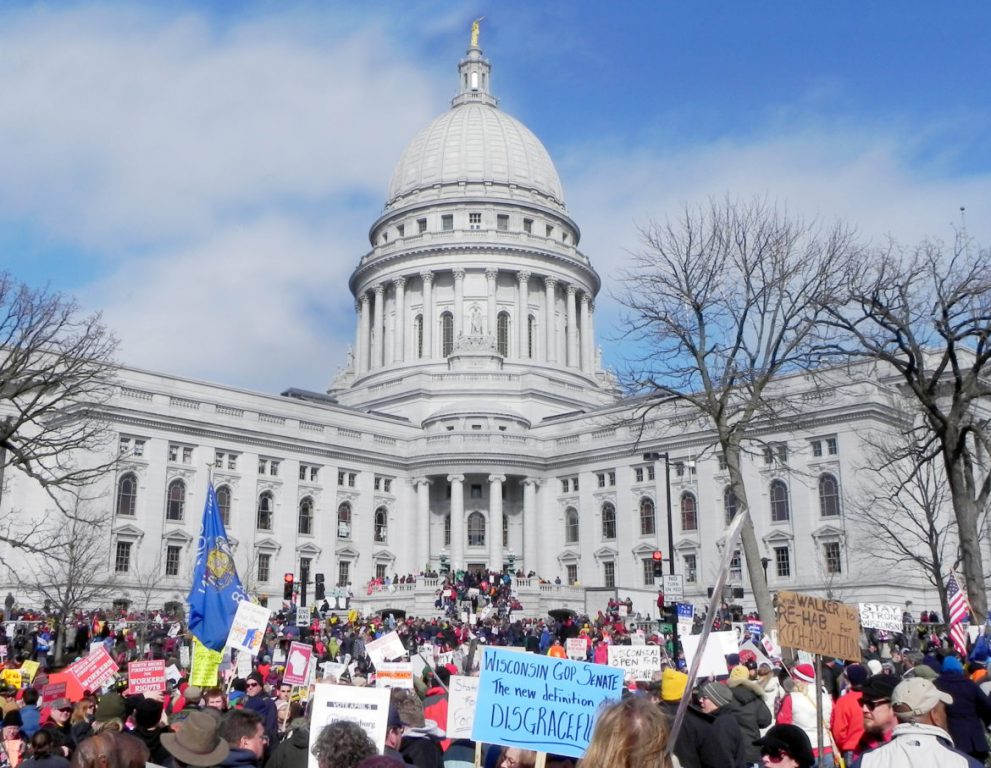Dane County Judge Hears Arguments in Lawsuit Challenging Act 10
2011 state law decimated collective bargaining rights for most public sector workers.

Act 10 protests. Photo by Richard Hurd. (CC BY 2.0)
A Dane County judge heard arguments Tuesday in a lawsuit challenging the sweeping 2011 Wisconsin law, which significantly curtailed the power of public-sector unions.
Unions representing teachers and other government workers filed the lawsuit last fall, a few months after Wisconsin’s Supreme Court flipped to a liberal majority.
But Wisconsin’s Republican-controlled Legislature argues the lawsuit should be dismissed, noting that previous court rulings have upheld the law known as Act 10.
During this week’s hearing, Circuit Court Judge Jacob Frost said he’ll issue a decision in the “near future” in response to lawmakers’ motion for dismissal.
For most public sector unions, Act 10 quashed their ability to bargain over anything other than base pay increases that are no higher than the rate of inflation. It also banned automatic withdrawal of dues and required annual recertification votes for unions subject to the law. And it forced affected employees to pay more for health and retirement benefits.
But restrictions under Act 10 did not apply to all public employees. The law allowed unions representing some police, fire and other public safety workers to keep their collective bargaining rights.
The lawsuit contends those distinctions violate an Equal Protection clause in Wisconsin’s Constitution.
“I represent the plaintiffs in this case, who are unions and employees in the state of Wisconsin who remained adversely affected by the discriminatory classification in Act 10 between general employees on the one hand, and public safety employees on the other hand,” attorney Jacob Karabell said Tuesday. “Act 10 created two categories of public employees, so-called general employees, who are stripped of effectively all of their bargaining rights, and so called public safety employees who retained effectively all of their bargaining rights.”
In particular, Karabell questioned why Act 10 gives motor vehicle inspectors a “favored designation” as public safety employees while, at the same time, the law classifies state conservation wardens, Capitol police and University of Wisconsin police as “general” employees who saw their labor rights curtailed.
“The distinction that Act 10 created between these groups of employees lacks a rational basis,” Karabell told the judge.
Misha Tseytlin, an attorney representing the state lawmakers, said legal precedent makes clear that it’s permissible for Wisconsin to make a distinction between public safety and other workers.
Even though such a strike would be illegal, Tseytlin said the state has a legitimate reason to be afraid of public safety workers walking off the job in protest.
“If they illegally strike or sick out or something, is that going to cause a problem for the state, such that it would be sufficient to override the specific goal of the legislation, which is to save money?” Tseytlin said.
And, when it comes to the “minutiae,” of deciding who counts as a public safety employee and who doesn’t, Tseytlin argued that’s an issue for lawmakers rather the courts to decide.
“(When) you have folks picking nits, that starts to look a lot more like legislating,” he said.
Wisconsin’s Legislature intervened in the lawsuit, which was filed against Wisconsin Employment Relations Commission and the state’s Department of Administration. Wisconsin’s Department of Justice, overseen by Democratic Attorney General Josh Kaul, is also asking for the case to be dismissed.
Act 10 spurred massive protests involving tens of thousands of people. Some slept in the state Captiol overnight, occupying the building for weeks.
In the year’s since Act 10’s passage, union membership has plumetted in Wisconsin.
The controversy helped launch a national profile for then-Gov. Scott Walker, a Republican, who signed the changes into law. Walker celebrated Act 10 as a windfall for taxpayers at a time when the state had been projecting a budget deficit.
Dane County judge hears arguments in lawsuit challenging Act 10 was originally published by Wisconsin Public Radio.
If you think stories like this are important, become a member of Urban Milwaukee and help support real, independent journalism. Plus you get some cool added benefits.
More about the ACT 10
- Susan Crawford Attempted to Overturn Act 10 - Brad Schimel - Feb 26th, 2025
- Despite Act 10, Union Argues UW Health Nurses Can Collectively Bargain - Rich Kremer - Feb 13th, 2025
- Protasiewicz Says She Won’t Recuse From Act 10 Case - Anya van Wagtendonk - Feb 13th, 2025
- Unions: We Remain Confident in Merits of Our Case - Wisconsin Education Association Council - Feb 12th, 2025
- Supreme Court Justice Brian Hagedorn Recuses Himself From Act 10 Challenge - Rich Kremer - Jan 31st, 2025
- Republicans Push Justice Protasiewicz to Recuse From Act 10 Case - Anya van Wagtendonk - Jan 29th, 2025
- Ruling That Struck Down Act 10 Put on Hold - Rich Kremer - Dec 20th, 2024
- Data Wonk: Did Act 10 Improve Wisconsin’s Economy? - Bruce Thompson - Dec 12th, 2024
- Op Ed: Republicans Behind the Times on Act 10 - Ruth Conniff - Dec 11th, 2024
- Murphy’s Law: Act 10 Ruling Could Be Tough to Overturn - Bruce Murphy - Dec 9th, 2024
Read more about ACT 10 here






















Cannot wait for Act 10 to be repealed.